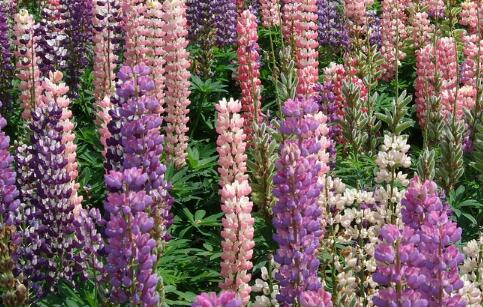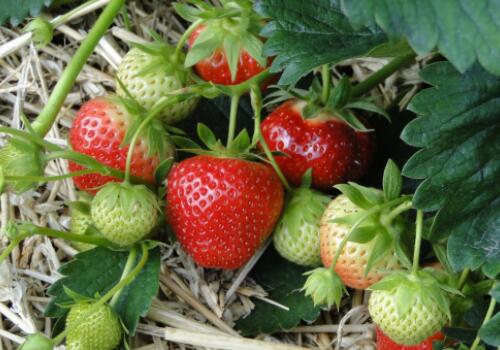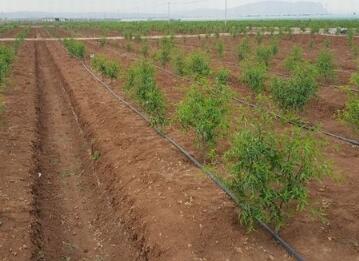Where is the "annual herb" Lu Binghua (lupin) suitable for planting? When will it blossom?
Lu Binghua, also known as "Lupin", is a plant of the genus Rosaceae, Leguminosae and Lupin. The inflorescence is erect, plentiful, colorful, with white, red, blue, purple and other changes, and the florescence is long, so it can be used for sheet planting or group planting in ribbon flower beds, and it is also a good material for cut flower production. Where is it suitable to plant Lu Binhua? When will it blossom?
Lu Binghua is a Taiwanese transliteration of her English name lupin. Many Hakkas regard Lu Binghua as a "Hakka mother flower", representing ordinary beauty and sorrow.

Where is Lubinghua suitable for planting?
Lu Binghua is an annual wild type in Italy, Spain and other countries in the Mediterranean region. The Soviet Union, the Netherlands, Belgium, the United States, New Zealand and so on are more cultivated. The sex likes to be cool, sunny, avoid hot, slightly shady. Deep-rooted, few nodules. Born in sandy soil, acidic sandy loam with deep soil layer, loose fertility and good drainage (ph value 5.5) is required, and the plant growth of neutral and slightly alkaline soil is poor.
When will Lubing blossom?
Under the natural conditions, it is best to sow in autumn, that is, from September to the middle of October, and the florescence is from April to June of the following year.
How do you plant Lubing flowers?
Planting Lubing flowers can generally be sown or cut. The specific planting methods are as follows:
Sowing and reproduction
Under natural conditions, autumn sowing blossoms earlier and grows better than spring sowing, so it is best to sow in autumn, and its seeds germinate neatly under the high temperature of 21-30 ℃. Of course, it can also be sown in spring, but the growing period after spring sowing in March is in summer, which may lead to non-flowering or low proportion of flowering plants, short spikes and poor ornamental effect due to the influence of high temperature and heat. Therefore, if there is no choice, it is best to sow seeds from September to mid-October so that they can blossom from April to June of the following year.
When sowing, 72 holes or 128 holes are sown and covered. Seedling soil should be loose and uniform, breathable and water conservation, special seedling soil or peat soil, perlite mixed use is better. Seeds larger, common or coated, about 40 / g. The optimum temperature for germination was about 25 ℃, and the medium was moist. The seeds were unearthed and germinated in 7 days and 10 days, and the germination rate was high.
2. Cuttage propagation
Cuttage propagation in spring cutting rhizome sprouting branches, cut into 8-10cm, preferably with some rhizome, cutting in the cold bed. In hot and rainy areas in summer, lupin can not die after summer, so it can be used for biennial cultivation. It is suitable to be planted in early spring, plant distance from 40cm, early planting, early flowering and seed setting. The aboveground part withered after fruiting before summer, and new plants germinated in autumn, or seeds were collected before withering. North China needs protection over the winter.
[tips]
Lu Binghua likes to be cool, sunny, hot and slightly shady. Deep-rooted, few nodules. It is required that the soil layer is deep, fertile and loose, good drainage, acid sandy soil (pH value 5.5), neutral and slightly alkaline soil plant growth is poor. The seedling stage of lupin is 30 to 35 days, and the seedlings are transferred and planted after the true leaves are fully unfolded. The root system of lupin is well developed, and the original soil is retained when transplanting seedlings, which is beneficial to slow down the seedlings.
Time: 2019-04-08 Click:
- Prev

How many times a year can strawberries be planted? What is the cause and prevention of abnormal fruit?
Strawberries, also known as pineapple strawberries, are widely cultivated in South America, China, Europe and other places. Strawberry has high nutritional value, contains a variety of nutrients, and has health care effect. How many times a year does the average strawberry plant bear fruit? What is the cause and prevention of abnormal fruit? Generally grown strawberries can bear fruit several times a year.
- Next

When will the winter jujube saplings be planted? How many trees can be planted per mu? Which varieties are good?
Winter jujube generally matures naturally from October to November in the Gregorian calendar, and it is named because of the early cold weather in the north. So when will the winter jujube saplings be planted? How many trees can be planted per mu? Which varieties are good? Winter jujube saplings can be planted in autumn or spring. Autumn is planted after falling leaves to before closing winter.
Related
- Fuxing push coffee new agricultural production and marketing class: lack of small-scale processing plants
- Jujube rice field leisure farm deep ploughing Yilan for five years to create a space for organic food and play
- Nongyu Farm-A trial of organic papaya for brave women with advanced technology
- Four points for attention in the prevention and control of diseases and insect pests of edible fungi
- How to add nutrient solution to Edible Fungi
- Is there any good way to control edible fungus mites?
- Open Inoculation Technology of Edible Fungi
- Is there any clever way to use fertilizer for edible fungus in winter?
- What agents are used to kill the pathogens of edible fungi in the mushroom shed?
- Rapid drying of Edible Fungi

